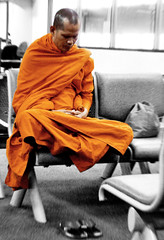Heal the world with Life.
Have a break, have a Life.
Life is my passion.
Life - be ready.
Create your own slogan with sloganizer!

There is a time for everything. A time to sow, a time to reap. A time to enjoy life, a time to pray hard. A time to relax, a time to be serious. A time to live life, a time to reflect. A time to laugh, a time to cry. A time to be born, a time to die.

"Rabbi, are you meditating or sleeping?" a Rabbi was asked by one of his disciple.
"I prefer that people think I am sleeping while I am meditating, think I am working while I am sleeping and think I am meditating while I am working."
Love is like sand in your hand. The more you try to grasp it and posses it, the more you will lose it. Squeeze and you will spill it. But, hold it loosely and it will remain there. In love and any kind of relationship, the more you try to grasp it tightly and possesively, the more you'll lose it and spill it. So, hold it loosely with respect and freedom for the other person, and your love and relationship will remain intact. 
When Jesus called his disciples, he called those who were close to Him (or at least want to be close to Him) and those who are eager to be sent for mission. Moreover, they are called into a community to build each other. We, Jesuits, are Jesus’ disciple of the present time. What does it mean to be Jesus’ disciple for the present time?

First of all, we are called to be close to Jesus himself. To be disciples and companions of Jesus, we need to be close to our leader Jesus, so that we can move and act accordingly to the movement and action of our leader. To be close to him help us to understand God’s will easily for that’s our aim in life and Jesus always did the will of God. Moreover, Jesus Himself who chose us and it’s not we who chose Him, just like the disciples did. We might not be very close to Him, for sure. But, that’s not important. The more important thing is whether we are willing to open ourselves to be closer to him or not. To be the real disciples, we have to open ourselves to be closer to Him. Peter, the leader of the disciples, in his early discipleship was not close to Jesus anyway. But, eventually he was, for he was willing to open Himself to be changed and to be closer to Him.
Secondly, to be Jesus’ disciples is to be sent for mission. It means that we are to be dispersed in small groups or even individuals. We are supposed to leave the warmness of our community and engage the danger and risk of mission. In this case, availability to be sent and moved everywhere is needed. Availability is an engagement to the vows of poverty and obedience.
Thirdly, we are called to a community. Community is part of our mission as Jesuits. Beside to be called to a mission, we are called also to build a community, where we gain the confirmation of our mission. We bring and share the consolation and desolation we get from the mission to the community. By sharing and exchanging experiences, we confirm each other’s vocation.
(reflection on Home Stay in Marikina)
This Christmas has been one of my best times in my Juniorate Program and one of the best Christmas in my life. One of its reasons is the Christmas Exposure in Marikina. This exposure made me learn more about Filipino, especially those of middle class. I learnt about how they spend their daily life during the Christmas and New Year’s break and about how simple but happy they are.
At first, I couldn’t feel the spirit of Christmas her in the Philippines. The secularity of Christmas and a lot of fun in the way people here celebrate Christmas have tarnished the spirit of Christmas on me. I was tired of many celebrations, funs and pleasures even far before the Christmas itself came.
The Christmas exposure, however, has turned my Christmas upside down. I stayed in a family with five members, all women. I felt like in my family, which are almost all women. They treated me very well also, as I am one of the members of the family. They also made me happy out of their happiness. When I went there I didn’t have that happiness. But, staying made me posses that happiness. On the first day, I spent one afternoon celebrating Christmas in the chapel. I was very happy playing and enjoying time with them. Before, I didn’t posses that happiness, that joy. Then, I realized that I liked the children very much. They have happiness and they shared to me. What a simple celebration but full of happiness!
One thing that me happy staying with the family is their simplicity. If they want, they can have a quite luxurious life. But, they only live their life simply. They also celebrate Christmas and New Years in simple way: not too much decoration, some foods, and drinks. It’s simple but enjoyable. And, I had a good time there.
Sometimes, I felt bored there. As I reflected on it, I realized that it was because during the Christmas and its preparation, I didn’t feel much the happiness and spirit of Christmas. I did have a lot of fun, but almost no joy. Since then, I began to distinguish fun and joy. I think what people here do for celebrating Christmas is more on fun. Joy and true happiness shall come from within. One thing that I couldn’t bear is that I missed my family, which was eventually a little bit filled by that stay in Marikina. Another thing is that I couldn’t bear the way people here celebrating Christmas. It was so noisy and almost identical with a lot of food, singing, dancing, and such. I don’t like them. But, I did like the one we had as community for Christmas, New Year and Kris Kringle. However, once more, this dislike was cured also by my stay in Marikina. My family celebrated the Christmas and New Year in a quite simple way. There was no noise and only few singing, dancing and drinking. I did appreciate this stay although its impression is not as deep as the one I had in Navotas.
(a small reflection on movie Bad ma ra khahad bord)
Every spirituality develops in the minds and hearts of particular people as a response to the crisis of their age and culture. Jesuit spirituality also came from that typical situation. Ignatius’ age was an age of rottenness in the body of the Church and the opposition of Reformation movement towards the Church. Ignatius’ way to reform the Church was from within, one of which was to found the Society with his friends, while the Protestant’s way was from outside, that is by proclaiming its separation from the Holy Church . The politic and economic situation at that time was very influential to the development of Jesuits spirituality. As time passes by and the situation of the world keeps changing, our spirituality has been suited to those changes.
We live amongst many tensions, which oblige us to discern and choose one of those tensions to follow. In this age, we live between the challenges of poverty and the life style of hedonism, between the challenge of obedience and the era of democracy, and between the challenge of chastity and the culture of free fraternization. It’s undeniable that we live in this era or some of us are people of this era, and somehow we have to compromise with those secular tensions in order to serve better in our ministry. For me, however, the vow of poverty is most needed to balance ourselves from the danger of those secular tensions. In other words, to balance the simplicity of our life as Jesuits and the fast movement of the globalization era, we have to cling to our vows of poverty, obedience and chastity. We can adapt our life to the new life style of globalization era, but, on the other hand, we have to maintain the basic principle of our lives. Religious people are needed in this era of globalization to do effective ministries and, at the same time, to maintain their virtues as religious. To do this, they need to adjust their spirituality to the demands of their time. The ability to read the signs of time, therefore, is highly needed. So, what am I going to do now? Formation is a good time to learn how to balance the simplicity of our life with the fast movement of the globalization era. The participation of the formators in my formation is still influential, although I have also a freedom to develop the kind of formation going with me. Therefore, if there are still some errors in my efforts of balance these two aspects, I can still get a lot of advice and direction from the formators. Indeed, it’s a good time to nourish these virtues with the help of many seniors and formators. Otherwise, if I am not able to nourish it now, when I am not in formation anymore, it will be very difficult for me to start balancing my life between these two aspects. When that happens, I may endanger my vocation.
(a short reflection on movie Life is Beautiful)
In the movie Life is Beautiful, Guido, through his jokes, his attractive attitude and laissez-faire bearing, shows how he understands life. The title of this movie implies that Guido really sees that life (at least his life) is beautiful, even when he is in a most difficult situation. Normally, people in a place like the camp concentration will feel very exhausted, sad, morose, or gloomy. This is what happens to the other people captured and placed in the camp concentration. But, unlike them, Guido tends to look always happy and pretends that nothing terrible happens for the sake of his son. He mirrors a person we called man for others for he doesn’t care about himself, but rather pays a lot of attention to his son.
Once, Ignatius as a General of the Society asked one Jesuit to give spiritual direction to some religious in Rome. This particular Jesuit refused to do so for he feared that by doing so he might endanger his vocation. Ignatius strongly admonished and reminded him not to think merely about himself but rather about those who need help. He mentioned the aim of the Society, which is, to save souls. This is what it means to be a man for others in Ignatius’ view. To be a man for others is to treat ourselves less importantly than others by surrendering ourselves into the hand of God and to put others in the highest priority. In the case of Guido, he forgets his tiredness, anxiety, and health in order to please his son and to free him from worrying about anything. He knows it will be very painful for his son to experience this discrimination and suffering. He wants his son to also experience that life is beautiful as he had experienced in his life.
As Jesuits, to be a man for others means to devote our life to loving, helping, and giving hope to others, especially those who are unloved, helpless, and hopeless. By doing so, we are supposed to be generous, that is, we are to give and not to count the cost, to fight and not to heed the wounds, to toil and not to seek for rest, to labor and ask not for reward. However, being a man for others doesn’t mean that one has to sacrifice himself by paying no attention to himself. A Jesuit has to nourish his life accordingly so that his vocation and his health are well kept. He has to make sure that by doing such kind of ministry he will not endanger his vocation and his health. Guido, when he chooses his wife and when he pours his joy to her and his son, doesn’t lose his joy because he knows that by doing so, he will be happy too. For him, happiness lasts longer if it also makes others happy.